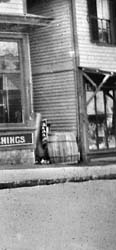 The Fireworks Stand
(early 1930s)
The Fireworks Stand
(early 1930s)Main Street, Vineyard
Haven, MA: Centre
Street to Church Street
Site 28 1/2: The Police Office
Alley
The following is a history of what used to be a little alley between Frank Swift's "Howes Clothing Company" and the original Vineyard Dry Goods Store, on the west side of Main Street in Vineyard Haven, Mass.
This is an unfinished draft! Do you have any memories of Howard Whitney's fireworks stand, Chief Ed Flaherty's office, Chief Sim Pinkham's office, or any of the other people, places, businesses or events mentioned here? Or do you have corrections, additions, or suggestions? Please contact Chris Baer <cbaer@vineyard.net>
 The Fireworks Stand
(early 1930s)
The Fireworks Stand
(early 1930s)
Before buildings #28 and #29 were joined in 1950 to form the Vineyard Dry Goods store, a narrow alley existed between them. Howard Whitney, who had previously operated "Whitney's Variety Store" in Cronig's Block (see Site #33), reportedly sold fireworks here during the early 1930s.
Sam Issokson said: "There was a little store between Frank Swift and the next store, I believe was a hardware store. That in-between store sold fireworks for the Fourth of July. That is where they used to sell fireworks. Between the dry goods store and Frank Swift's building. There was an alley there then before it was all joined together. It was little - it was big enough for a door, and may go back fifteen, maybe, less than twenty feet I'm sure. There must have been a roof, because it was dry in there. [We were] little kids, during the depression, about ten years old, something like that. I know they used to sell firecrackers there."
Walter Renear said: "Would you believe that in the thirties, when firecracker were legal, they built a little stand in between these two buildings to sell firecrackers? They could have burned the damn thing down! Howard Whitney ran it for years."
"Down back of, well it's the town parking lot now, but do you remember some old pictures of the Fischer building down on Union Street? In back there Fischer had a five-hundred gallon gas tank, buried in the ground, not very deep. It hadn't been used for quite awhile when we were kids. We put a firecracker down the end, and blew the tank out of the ground. We were standing here, and the tank rolled over, went that way. Fumes are worse than liquid! He had these two big international delivery trucks that he had gas for."Stan Lair and Basil Welch on Howard Whitney:
BW: Howard Whitney I knew for many years back when I was, well I know he worked at Renear's Garage, pumping gas, polishing cars, changing tires. I remember him most as a kid 'cause every fourth of July he used to sell firecrackers - fireworks were legal at the time. He had a little place in between a couple of the buildings down on Main Street, between the two dry goods stores, or somewhere in there. He had a little stand that he used to sell from. Whit - they always called him Whit - for many years he was the night operator at the telephone office.
SL: That's right, yeah. I forgot about that.
BW: He went from midnight to seven or eight o'clock in the morning. God, I remember way back, long before I ever worked at the phone company, I was a teenager, and early twenties, we used to go hunting in the morning. My father had an alarm clock. Many's a night I'd call up Whit, and ask him if he could give me a call at five o'clock to wake me up and he always did it. Guess he was a member, well he was a strong member of the Legion.
SL: Yeah he was in the Marine Corps I think, in World War I.
BW: Yeah, he was also in World War II, wasn't he? He had something to do with it. He was in the reserves or something.
SL: Yeah I guess he did have a reserve, yeah that's right. A lot of them boys were in it, like Chicken Baptiste. Forget what they called the unit.
BW: Like a home guard, or National Guard. Right.
SL: Yeah, that's right. Yep.
BW: I know Whit married. He was married to Louise Whitney.
SL: She was the divorcee of Sherman Swift.
BW: Whit was a nice guy. Tall, thin, mustache. He was another happy-go-lucky one. Nice guy.
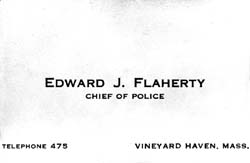 The Police Office
(1935?-1943?)
The Police Office
(1935?-1943?)
The Tisbury police department occupied a tiny office in this alley during
the late 1930s. A blue light bulb was strung across Main street so that
the telephone company could signal the patrolman if a call came in.
Bob Renear said: "A little closet - It was about a little bigger than a door's width. And they had a desk in there, and a telephone."
"A blue light. When you wanted to call the police at night, they would trip that light bulb. They would answer the phone and call back to the operator."
Constable Gould and an early history of the Vineyard Haven Police Department: Benjamin N. Luce was the town constable at time of the 1883 fire, and
by 1897 Alvin H. Cleveland was the town's policeman. For decades the only policeman in town was Henry M. Gould (1842-1922), who was the grandfather of Mrs. Inez (Merry) LeBeau (see Site #4.) Gould moved to the island from Montpelier, Vermont in 1870, and first worked "breaking colts" in Chilmark. By 1880 he was working as a Chilmark fisherman. In August 1897 the Vineyard Haven reporter for the Gazette was calling Gould "our stalwart policeman." Gould was living and working as a stone mason in Vineyard Haven in 1900, although he evidently continued to maintain his post as constable. In April 1905 the selectmen appointed Gould as the night watchman. The Gazette reported: "He will have the care of all the street lights and will go on duty between 8 and 9 o'clock." The 1907 Vineyard Haven directory lists Gould as the "police." In January 1910 the Gazette made references to Gould "making his diurnal rounds to light and extinguish lamps and to 'arrest evil doers.'"
|
In February 1922 the Gazette made reference to the "new constable at his place of business on Main street." In July 1922 there were references to policeman George Dolby and a man named Kenneth working as a traffic cop. By early 1925, Harry Webb was a Tisbury policeman.
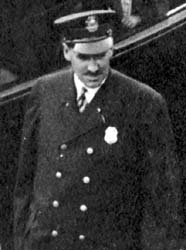 Tisbury policeman
Harry Webb in a 1925 parade.
Tisbury policeman
Harry Webb in a 1925 parade.
Stan Lair and Basil Welch on Harry Webb:
SL: Harry Webb. Remember him?
BW: Yeah. Harry Webb lived in Oak Bluffs. He was the registrar of motor vehicles on the island here when I knew him. I guess before that I think that he was a policeman, or a chief of police, or something in Oak Bluffs.
SL: He was in the police department over here, in Vineyard Haven, at one time.
BW: Well I don't remember that.
SL: That was in the twenties. Way back in the 1920s, something like that.
BW: But I remember him as the registrar. I got my license off of him. And Harry had three or four daughters, and he had one son. And they were good-looking girls, I know, they were older than I was. One of them married my uncle, my mother's brother. She's still living in Oak Bluffs. And one of them married Domingoes Borges, Dick Borges. And the others, they're are off-island, I guess. Harry ran the registrar's office right in his house. He was registrar for a long time.
SL: He was.
BW: He gave a hell of a pile of licenses out on this island.
SL: Yeah. He'd always take you on the same route, too, to get your license. Certain places you'd turn around, up on Barnes Road, up in that area. You'd come down through, and go around Circuit avenue, and so forth.
BW: Yep. Stop, so he could get his mail….
SL (Laughs) I remember when they used to stop cars on the Beach Road, too, when Harry was a policeman.
BW: Yep. License check.
SL: Yep. Big lineup of cars coming from Oak Bluffs, and they'd want to see your license, and your registration, and so forth. They'd hold you up there for sometimes an hour, there'd be so many cars, and they'd be checking them out.
By 1925 Officer Ed Flaherty was hired. Edward Joseph Flaherty (c.1883-4 - 1941) was born in South Boston, the son of Thomas Flaherty and Margaret O'Kane. He served ten years on the Boston police force before coming to the island.
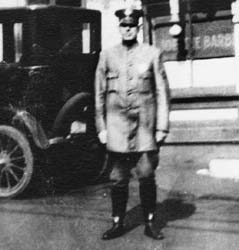 Chief Flaherty outside
Joe the Barber's Shop (Site #3)
Chief Flaherty outside
Joe the Barber's Shop (Site #3)
Mrs. Agnes Rice (daughter of Chief Flaherty) said: "He was a Boston policeman. He was a sergeant on the Boston police force. Back before he came here. They had something that - they didn't have it in the history books, I don't think - they had a Boston police strike. All the policemen in Boston struck. He was secretary of the Boston police union. And so he stuck it out until the last minute. He didn't really want to strike, but he had to do it, he had to go along. He had all the books about the Boston police strike. He had to strike, and so he was out of work as a policeman for a few years. He went to California. He drove... in California he did the trolley cars. And then he came back, and in Chicago he did the same thing, did the trolley cars in Chicago. And then he came back to Boston and worked in a furniture store. And then he was offered a job down here as the chief of police. You have heard of Fred Vincent? Fred Vincent was a selectmen at the time, and he hired my father. He was selectmen - I forget who the other two men were, but Fred Vincent hired my father. My father heard of a job, a chief of police opening down on Martha's Vineyard, and he always wanted to live in the country. My mother was familiar with the island - she used to come summers. And so he came down here and applied, and he was hired. First Irish-American policeman on Martha's Vineyard!"
In July 1926 the Gazette reported that the town police force had been equipped with a new uniform, and the paper mentioned officers Ed Flaherty and Jack Narden. During the mid-1920s, John Larnardone worked as a Tisbury policeman for several years - he had moved to the island as a sailor about 1923, and in the fall of 1928 left the force to enlist in the state police. In June 1929 the new police officer on duty with "Chief" Edward Flaherty was Daniel MacIsaac of Somerville, who had worked five years with State Police force. That month Chief Flaherty's force was listed as Daniel MacIsaac, James Barter Sr. at West Chop, and Simeon Pinkham. Officer Simeon Carnes "Sim" Pinkham (1902 - 1957) was born in Vineyard Haven, the son of Capt. Simeon C. Pinkham and Lavinia Lewis. He had been employed as a taxi driver and mail carrier on the island before joining the Tisbury police force. In 1935 he served as a state witness in the murder trial of Harold C. Look.
In July 1929 the 'Round 'Bout Tisbury column in the Gazette reported:
"Officer Simeon Pinkham is not a gentleman to be trifled with when on duty, as a bunch of very gay and carefree male visitors found out last Saturday afternoon. Landing from a small yacht that laid at the wharf, half a dozen husky young men wandered upstreet to look the place over. They entered the Tisbury pharmacy among other places, and while there one stole an article from a display case and the group left the store in a hurry without attempting to cover the theft. They came running down to the wharf, shouting to companions aboard the yacht to cast off and get away. Officer Pinkham, who was on traffic duty near the store, was notified almost immediately and reached the dock almost as soon as the yachtsmen. 'Pay for that article or go to jail,' said the officer. The article was paid for without any discussion. 'Now cast off and get under way,' he ordered, and he was obeyed. So quickly and quietly was the thing done that scarcely anyone knew about it."
Although the 'Round Bout Tisbury column was notorious for its tongue-in-cheek jokes and exaggerated stories, the following report may very well indicate that some sort of construction was taking place in this alley in 1927:
In August 1927 the Gazette's "Round 'Bout Tisbury" column reported the following, probably as a joke:
"Clarence Ward is employed in erecting a brick structure on Main street between the business emporiums of Frank Swift and Ernest Tilton. Though narrow of front Mr. Ward announces that it is to be three stories in height, and to be occupied as follows: first floor, offices of Bartlett Mayhew; second floor, hot dog and sandwich stand, yet to be leased; and top floor, the shoe shining parlor of Benjamin Turner."
The same columnist wrote another humorous column in March 1935, which suggests that this may have been the year the police took over the fireworks stand for their office:
In March 1935, the same Gazette columnist reported (to be taken with another grain of salt):
"Work has begun refitting the new police headquarters on Main street in the spacious edifice between Frank Swift's emporium and Dave Levine's mercantile establishment. Hardwood floors and futuristic appointments are to be installed, it is understood, with hot and cold handcuffs, and a mahogany rack for storing pistols, blackjacks and riot guns. There may be sufficient room left to house the officer on watch, but this is regarded as unimportant. That evil doers may receive timely warning and flee from the wrath to come, or mend their ways, the establishment bears a flaunting sign across the front, reading: 'Fireworks.'"
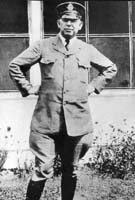 Chief Flaherty,
Tisbury's first Police Chief
Chief Flaherty,
Tisbury's first Police Chief
Mrs. Agnes Rice (daughter of Chief Flaherty) explains:
"My father's office was wedged in there somewhere between Frank Swift's and the dry goods store. It was one little room, and no heat or anything. He just had a telephone in there, and a desk, and a chair. And that was my father's really first office building."He had a phone outside that was on the wall of what is now the Dukes County Bank. On that side wall there used to be a telephone. There was a wire from across the street, from the post office to that telephone. In the middle of the street, on the wire, was a light. And when there was a call that light would go on and my father would go to answer the phone. Whenever he'd see the light, he'd go, and they kept a record of his calls, and he'd have to call the people back.
"He didn't ever have an office until he had that little one I'm telling you about, right next to Frank Swift's. Before he had that, he had the light on the street. But then he still had the light on the street, but he used to go into his office to answer the phone. He was the chief of police for fifteen years, from 1924 I think to fifteen years after that. I think it was '41 - he died the year of World War II.
"My father used to not like me to go downtown, and so he'd bring me in [this office] and lecture me and tell me 'I don't want you to hanging around town. I want you to go home.' I remember it very well. What was in there was just a desk, and a telephone, and a chair. That's all that was in that little room. He had his books and his records in there, but in the wintertime there was no heat, so he couldn't spend a lot of time in there.
"On Main Street, he would go into all the stores. But he particularly liked Paul Bangs' market. He was very funny with Mr. Bangs. And he liked Dan the barber, Dan Alisio. And he used to go up the street where Renear's garage is. He used to go in there quite often. In the winter when it was cold he used to have to go into a lot of the stores and get warm, so those are the places he'd go. He had like a loop. He didn't have a car when he first came; he was on his feet. And for years he didn't have a car. He just did the main drag. I don't know how he got to where he had to go. And then they finally provided him with a car. He was a busy policeman because he was all by himself most of the time.
"He had Sim Pinkham. And he had Bill King. And he had Harold Webb. In the summertime he had two or three extra people. And I forget who else there might be, but those I do remember. They used the office, they used to have to report to work there. There are a lot of police records with his name on them which are down in the police office now."
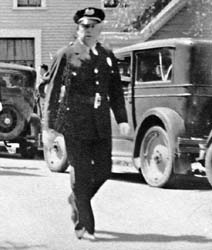 Chief Flaherty in
a parade on Main Street.
Chief Flaherty in
a parade on Main Street.
Walter Renear said: "Flaherty came first, then Pinkham. Billy King was a patrolman, about the time that Sim Pinkham was Chief. Harold Webb was patrolman mostly, yes that's Harold of the campground. Mostly a night watchman I think Harold was. But he was off and on in the police department. He was in and out. Probably just an odd job.
"No cruiser. Or at least, what they got was an allowance for one car. The town paid them, I don't know if they paid them by the mile, or how they paid them, but they paid them something for the use of one car. They carried a gun.
"I remember the blue bulb. It was in two different places. It hung right over the intersection of South Main, right in front of the Educomp building. And then it was on the head of Union Street on Main. They put a wire across the street, and hung it right in the middle. Same thing down at Educomp."
Jean Swift said: "Yes! People don't remember that [police office.] There was a sort of a alleyway and it was very narrow and in that alleyway was the police station. I never was in it."
Sam Issokson said: "When the policeman had a call, and the light would come on, so he'd answer the phone. (Laughs) That was the communications center! Probably the operator in the phone office [turned on the light]. That was down where Educomp is now."
Stan Lair and Basil Welch on Ed Flaherty:
BW: Ed Flaherty, yep. Ed was the chief of police. First chief of the town of Tisbury. Ed lived up on the State Road. George Rice owns the house now, who is Ed Flaherty's son-in-law. Ed cut quite a military figure as a chief. He was a big man, his posture was perfect, and he used to ride a white horse and lead the parades that they had. And he always cut a fine, cavalry-type military figure. And he was the world's worst driver when it come to an automobile.
SL: He was the first uniformed policeman we ever had here.
BW: First uniformed was he?
SL: Yeah. Before that they had constables.
BW: Oh yeah. But he was a good chief. The kids were scared to hell of him.
SL: He came down here after the Boston police strike or something. That'd be '20, '21, somewhere along in there. I think he was a Boston policeman, and they struck, and then Coolidge was governor then, and he wouldn't hire him back.
BW: He always looked more like a big German officer than he did an Irishman, I'll tell you that.
SL: Nice guy, though. I always liked Ed.
BW: Yeah, yeah.
Stan Lair and Sid Counsell on the Tisbury police:
SC: Well, let's see. There was Mr. Flaherty, Ed Flaherty...
SL: Ed, he was chief...
SC: There was Sim Pinkham. There was Billy King. And Mr. Webb.
SL: Harold Webb?
SC: Yeah, Harold Webb used to be on it. That's about it. Well, they had special cops, too, you know.
SL: On the night before the Fourth they had special cops around.
SC: Doc Amaral, Pat Cleveland, somebody like that, you know?
Hollis Smith and Stan Lair on the Tisbury Police:
HS: Well, they had one [policeman], Ed Flaherty.
SL. Yeah. He was a good one.
HS: He was the chief.
SL: He was a good policeman, too.
HS: He was! I guess he was one of the striking cops from Boston, and he came down here. But he was a doggone good policeman.
SL: He was an easygoing man, but, you know, he was friendly and all that, but...
HS: ...Oh yeah, but he didn't fool around with you...
SL: ...but he did his job.
HS: Directing traffic, and the whole works. Just all by himself. The same with old Mike Fontes, used to keep the streets clean all by himself with his push broom.
SL: He'd work at night!
HS: With his barrel on a little carriage, he'd push it around.
SL: Yeah! That's right!
HS: Well let's see - Sim Pinkham come in after Flaherty, didn't he?
SL: Yeah, I think he did.
HS: I think he did.
SL: Then Billy King.
HS: And Harold Webb...
SL: Harold Webb was a patrolman.
HS: ...was a night cop. And then Pete Crowell - he was on for awhile.
SL: Yeah, that's right.
HS: But there weren't too many. The chief and usually one man, for nights. And half the time the chief did everything, day and night.
In April 1930 Chief Flaherty, Officer Pinkham, and Special Officer Eugene
Rogers were mentioned in the Gazette after they made a number of liquor
arrests. In March 1940, the Gazette reported the hiring in Vineyard Haven
of "the first lady cop in the county" but declines to give her
name. Other early police officers included Harold Webb, who later
started Webb's Campground, and Bill King, who was a night watchman for many
years and became the Chief of Police in 1957.
Stan Lair and Basil Welch on Harold Webb:
BW: Harold Webb was one of the Webbs out at head of Lagoon Pond. I don't know much about the family, except they've owned the house out there for many many years and it supposedly is one of the oldest houses on the island. It's a little old Cape Cod farmhouse, beautiful house, it could be if it was restored, it'd be a beautiful house inside. Great huge brick fireplace in the kitchen and the beams in the rooms are cut like they would be for a ship. Harold worked for many years for Manny Duarte, delivering oil, and they used to deliver with five gallon cans. They used to fill the five gallon cans, and walk in, dump 'em in the barrel, walk back out, another two five-gallon-can-fulls... And then he worked on the police department at Vineyard Haven for quite a long time 'till somebody complained that he lives in Oak Bluffs and worked in Vineyard Haven so that was the end of Harold on the police department. I don't think he ever really did anything after that.
SL: No, I don't think he did.
BW: He got married late in life to his wife Ruth who was from off-island somewhere. And she and Harold got married and Ruth kinda always worked so I guess Harold kinda gave up on work, and now they're both retired.
SL: Well I think Harold made a little money on the campground he had, Webb's Campground. Probably inherited I guess from his ancestors. He turned it into a profitable thing.
BW: Of course they sold all the property, house and everything. Well they old everything out there to a couple of women that run the place, sold it a few years ago but they have life rights to the house.
SL: Oh, they sold the old house?
BW: Sold the whole thing, kept life rights to it.
SL: That's probably how they got along. Because I imagine they got pretty good money for that property up there.
Chief Flaherty held his office until his death in 1941 at the age of fifty-seven.
Agnes Rice said: "[He] died on the job. He had a stroke and then died two days after. He had one stroke, and he went back to work, and two months later he had another stroke and died.
"You know where Murdock's Fudge is? That was where his office was when he died. There were a couple of desks, and a couple of chairs there, and that was a little more official. He was in the Union Street office when he died. After he died Sim Pinkham was chief of police, and it was in the same office for awhile I know, then I think I lost track after that."
Simeon C. Pinkham became the chief of police after Flaherty's death. In January 1942 the Gazette made references to special officer Louis Maciel, as well as officer William King. In June 1943 Ernest Campos was noted as a Tisbury constable.
In February 1943 the Gazette reported that the "Tisbury police are to have a new and up-to-date station headquarters for the first time in the history of the town… The location is the empty store in the Cronig Block." (See Site #33 for more on this office.)
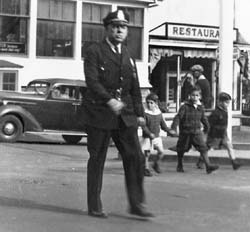 Flaherty?
in a parade near the intersection of Union Street. Lane's Block is visible
in the rear.
Flaherty?
in a parade near the intersection of Union Street. Lane's Block is visible
in the rear.
In November 1944 police moved from Cronigs block to the former fish market on Union Street.
Chief Pinkham died in February 1957 at the age of fifty-four.
Basil Welch and Stan Lair on Sim Pinkham:
SL: Sim Pinkham.
BW: Yeah, Sim lived across from Hatch Road, right next door to Lewellyn Cleveland. Sim Pinkham was the night watchman here in town. We only had two policemen there for a long time. Ed Flaherty was the chief, and Sim Pinkham did the other, night shift. Then they had Billy King, and Sim did the early evening shift and then when Ed Flaherty died he was made chief. And he was the chief of police here in town for quite a few years. He was a nice guy. He could put the fear of god into you 'cause he had a very pock-marked face and he could look awful tough if he had to, but he had a big heart for kids.
SL: He had a terrific memory for number plates, I remember that. You asked him what your number plate was, he could come right out with it. He knew them all. His father also was named Sim Pinkham. He was Capt. Sim Pinkham, and as I remember him he was a caretaker for Badger down at West Chop. He used to sail Badger's boat I guess, once in awhile. That was old Sim.
According to the 1957 "Tisbury Tides" Guide by League of Women Voters, "There is at present only one officer on the force in Tisbury with a permanent appointment as patrolman. He is the present Temporary Chief." It also states that in 1956 there was a chief at a salary of $4180; two patrolmen at salaries of $3630 each; two summer patrolmen, and six special police.
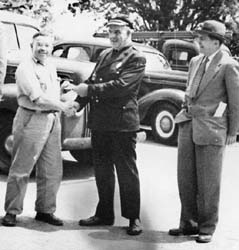 Walter Renear writes about this photo: "Shaking hands with the policeman (Sim Pinkham) is Chester Brennan." |
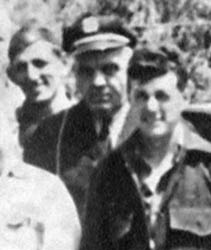 |
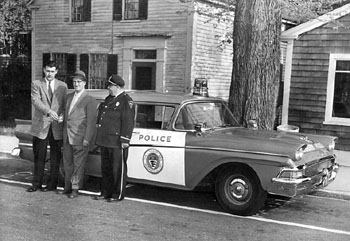
Dixon Renear, William Carroll and Chief William King, about
1958, handing over the keys to the town's first cruiser. Prior to this,
patrolmen were paid one dollar per day for the use of their cars. The photo
was taken on Union Street. The Union street police station (occupied 1944?-1965)
is visible on the right. Photo courtesy Barbara
Baldwin.
Barbara Baldwin writes: "My Uncle [William King] took over after Chief Simeon C. Pinkham died in 1957 and was made permanent chief of Tisbury in 1958. Before that he served as Martha's Vineyard circulation manager for The Standard Times."
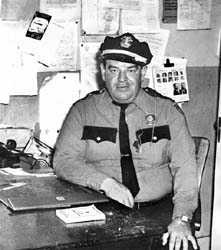 Chief King inside the Union Street station. Photo courtesy Barbara Baldwin.
Chief King inside the Union Street station. Photo courtesy Barbara Baldwin.
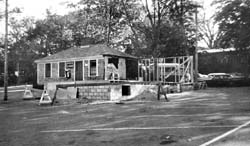 Tisbury's new Police
Station was first occupied in the summer of 1965. It stood roughly on the
location of the historic "Great House."
Tisbury's new Police
Station was first occupied in the summer of 1965. It stood roughly on the
location of the historic "Great House."
Return to Centre Street to Church
Street
Return to Tisbury History